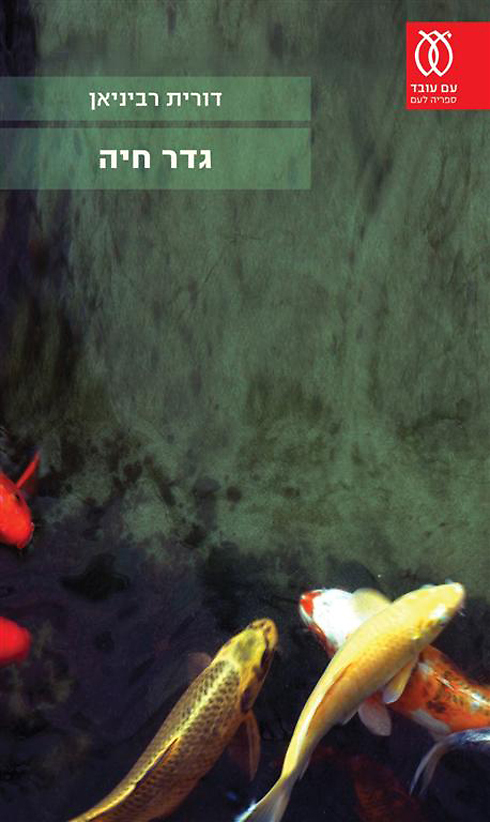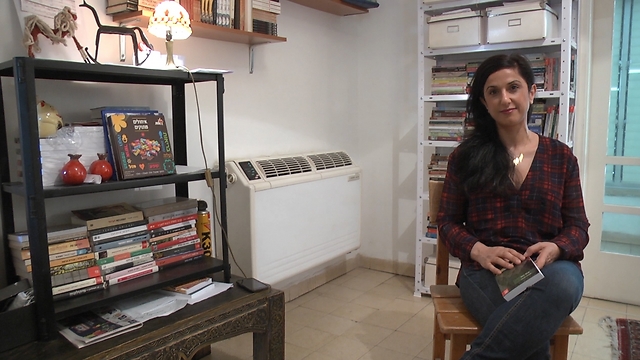
Book on Israeli-Palestinian love excluded from schools
Education Ministry decides not to include Dorit Rabinyan's 'Borderlife' in advanced literature curriculum, arguing it might encourage intermarriage.
The Education Ministry decided not to include the book "Gader Haya" ("Borderlife") by Dorit Rabinyan, a love story between an Israeli woman and a Palestinian man, in the advanced literature curriculum in Israeli high schools, arguing that it might encourage intermarriage, Haaretz reported on Wednesday night.
The decision not to include the book, released last year, received Israel's prestigious Bernstein literary prize, in the curriculum was made despite the fact a committee of professionals in the field recommended to include it. Education Minister Naftali Bennett, who was briefed on the decision, announced he supports it.
"Intimate relations, and certainly the available option of institutionalizing them by marriage and starting a family - even if that does not happen in the story - between Jews and non-Jews, are seen by large portions of society as a threat on the separate identities (of Arabs and Jews)," said acting Pedagogic Secretariat Dalia Fenig.
"Borderlife," released last year, received Israel's prestigious Bernstein literary prize. It tells the love story of Liat, a Jewish Israeli translator, and Khilmi, a Palestinian painter. The two meet in New York and fall in love, but then the two return to their separate homes in Tel Aviv and Ramallah.
"In the reality of the (Israeli-Palestinian) conflict, such a work can cause controversy and might even lead to the opposite result of what the work seeks to achieve, and in that fan the flames and increase the hate," the Pedagogic Secretariat in the Education Ministry said, explaining the decision.
"The story is based on a romantic motif of a forbidden/secret and impossible love," the ministry said. "Adolescent youth tend to romanticize and don't have, in many cases, the systematic point of view that includes considerations about preserving the identity of the nation and the significance of assimilation."
Assimilation, a term used for the gradual weakening of Jewish identity with immersion in Western culture, is one of the most explosive issues in the Jewish world. One-third of the world's Jews were killed in the Holocaust, and some Jews fear that intermarriage and assimilation now threaten the community's continued survival.
The Israeli high school curriculum includes books on a variety of hot-button issues, including "Khirbet Khizeh," a 1949 novel about the expulsion of Arabs from a fictional village by Israeli soldiers, and "A Trumpet in the Wadi," a 1987 novel about a love affair between a Jewish man and a Christian Arab woman.
"The literature curriculum includes works that deal with similar themes (for example, the novel 'A Trumpet in the Wadi' by Sami Michael), but with a perspective of time. The work in question is current, and therefore confronts the readers in a very tangible and powerful way with the dilemma of institutionalizing love when they do not have all of the tools to contemplate such decisions," the ministry asserted. "Young people aged 16-18 in the secular Israeli reality are not required to make this sort of decision."
The ministry further wrote that "The education system strives to educate students on the need for a shared Israeli future, tolerance and the prevention of racism, while at the same time educate to protect the identity and heritage of students from all sectors. Maintaining a balance between the different components is not a simple thing at all."
Another claim made against the book referred to the power of literary works. "Even the critical discussion of the work that will be done in class (if at all) will not overpower a very strong message in the work that the right, and best, thing is the realization of the love of Khilmi and Liat," the ministry said.
"A review of the work says: 'Dorit Rabinyan's new book Borderlife is a harsh self-criticism of Israeliness, mostly on the left-wing, liberal side of it' (Motti Fogel, Ynet). Meaning, even among literary critics, there are those who view the work as a criticism by the author herself of the fact the romance was not institutionalized."
The Education Ministry's letter also included the arguments in favor of including the novel in the curriculum. One such argument dealt with the advantage of holding a discussion on, and analyzing of, an issue relevant to the current Israeli reality.
Another reasoning in favor of the novel argued that it is exactly the choice of a complex topic such as this, which is not part of the consensus, that could lead to a passionate discussion "that would encourage students to learn, and serve as an educational experience and a platform for personal growth."
The work "presents the Palestinian Arab and his family as people, allowing the reader to treat him as an equal, and in that could contribute to bringing together the two populations," the arguments in favor of the novel said, adding that the work would've been included as one of 5-6 elective topics, meaning a teacher could choose not to teach it.
Eventually, as mentioned, the Education Ministry's Pedagogic Secretariat decided to accept the arguments against including the book.
Author Dorit Rabinyan said on Wednesday: "I guess someone in the Education Ministry still believes in the power of literature to have an impression on the tender souls of teenagers, and it is that which appears optimistic to me for some reason. It's important to remind the decision-makers at the ministry that the banned works are the ones that teenagers most want to get their hands on and uncover the secret of the decision to ban them."
She called on students to read the book if they want to, "even if it is not studied for the matriculation exams. It's allowed in democratic states."
The Ministry of Education said in response: "Professionals in the field discussed the inclusion of the work in the curriculum. After giving it serious consideration, and after weighing out the advantages and disadvantages, the professionals decided not to include the work in the advanced literature curriculum."
The Associated Press contributed to this story.












